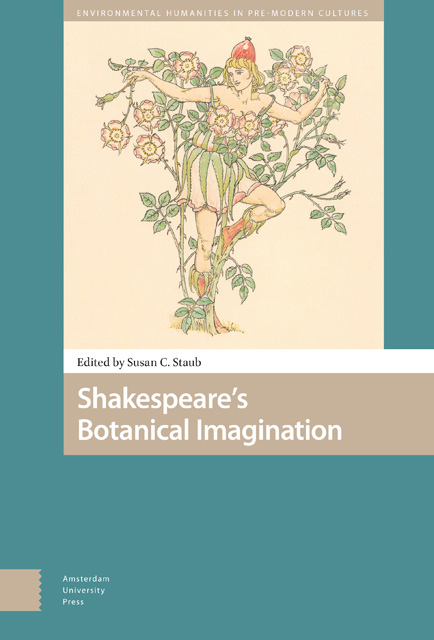3 - Botanical Barbary : Punning, Race, and Plant Life in Othello 4.3
Published online by Cambridge University Press: 17 October 2023
Summary
Abstract
The barberry plant never appears in Othello, but its resonances in Act 4 Scene 3 crystalize the play’s concerns with racial status, women’s domestic knowledge, and European beauty standards. Scholars have begun to consider the scene’s global context, concentrating on Desdemona’s revelations about her mother’s servant, Barbary. Yet Barbary’s name also conjures images of the more familiar barberry bushes of England, which proved common in recipes for lightening hair. The scene’s invocation of the barberry plant underscores the play’s concerns with culturally determined notions of beauty and the potential for “fair” outsides to mask unchaste interiors. In considering barberries beside Barbary, this essay sheds new light on the play’s anxieties regarding racial categorizations, beauty, and female virtue.
Keywords: race, geography, puns, blackness, cosmetics, domesticity
In Act 4 Scene 3 of Othello, Desdemona and Emilia engage in a lengthy conversation that reveals their private thoughts about women’s power within marriage. At the same time, Desdemona’s recollections of her early life highlight the wider context of what otherwise looks like a thoroughly domestic scene. Preparing for bed after Othello’s violent outburst, Desdemona remembers the mournful song her mother’s maid Barbary sang as she died. With the mention of Barbary, awareness of the outside world—beyond the boundaries of Venetian society as well as beyond the bedroom—creeps into this scene, and the resonances of this global context have registered, even if vaguely, in scholarship since the 1970s. Leslie Fiedler, for example, interrupts a rollicking exploration of the scene as evidence of the play’s desire to prove women “weak and false” to wonder at the presence of “a ghost called ‘Barbarie’—an odd name, really, being not merely a variant form of ‘Barbara’ but also one-half of Iago’s insulting epithet for Othello: ‘your daughter covered with a Barbary horse’.” Fiedler then muses, “‘Barbary’- Berber-barbarian—it is a fascinating series, not so much irrelevant as displaced and to be solved, resolved, like some riddling conjunction in a dream.”
- Type
- Chapter
- Information
- Shakespeare's Botanical Imagination , pp. 87 - 102Publisher: Amsterdam University PressPrint publication year: 2023



